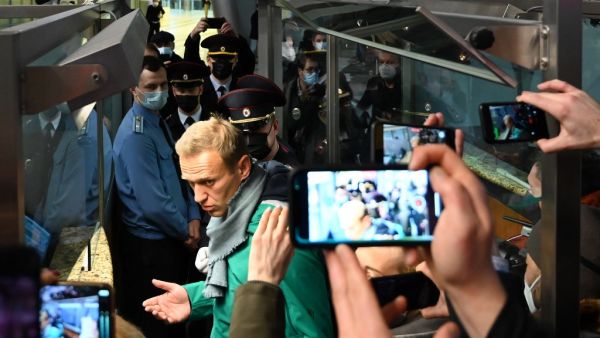Russian opposition politician Alexey Navalny, who got treatment in Germany after alleged poisoning, was arrested in the capital Moscow upon his return.
Navalny and his wife Yulia Navalnaya were originally scheduled to land at Moscow’s Vnukovo airport but the plane they were on board was diverted to Sheremetyevo airport.
The arrest of Alexey #Navalny in Moscow is an offence to the international community, to Europe that helped save his life.
— David Sassoli (@EP_President) January 17, 2021
We ask the Russian authorities for his immediate release. We are ready to invite him to the @Europarl_EN.
In a statement, Russia’s Federal Prison Service said Navalny was detained “for repeated violations of the probation period” since Dec. 29, 2020, and will be produced before a court.
Meanwhile, President of European Council Charles Michel called on Russia to release Navalny.
“The detainment of Alexey #Navalny upon arrival in Moscow is unacceptable. I call on Russian authorities to immediately release him,” said Michel on Twitter.
Navalny, 44, a fierce critic of Russian President Vladimir Putin, fell sick last August on a flight to Moscow. After an emergency landing in the Siberian city of Omsk, he spent two days in a Russian hospital before being sent to Berlin for treatment.
After tests in several laboratories, German officials said Navalny was poisoned with the Novichok nerve agent, which was also used, according to the UK government, in a 2018 attack on former Russian spy Sergei Skripal and his daughter in the British town of Salisbury.
In Moscow, @navalny is being detained just right now. Perhaps #Putin feels that he has nothing to lose - since he was the main suspect accused of poisoning his rival. pic.twitter.com/Em4fLazGuN
— Hanna Liubakova (@HannaLiubakova) January 17, 2021
Russian authorities deny any involvement in the case and contend that chemical weapons are neither developed nor produced by Russia since the last chemical round was destroyed in 2017, as verified and certified by the Organization for the Prohibition of Chemical Weapons.
This article has been adapted from its original source.










